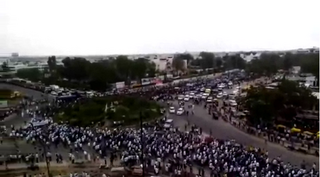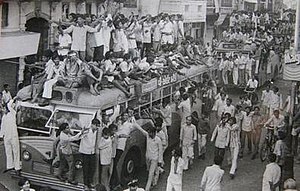
Morarji Ranchhodji Desai was an Indian independence activist and politician who served as the Prime Minister of India between 1977 and 1979 leading the government formed by the Janata Party. During his long career in politics, he held many important posts in government such as Chief Minister of Bombay State, Home Minister, Finance Minister and 2nd Deputy Prime Minister of India.
Samyukta Maharashtra Movement, commonly known as the Samyukta Maharashtra Samiti, was an organisation in India that advocated for a separate Marathi-speaking state in Western India and Central India from 1956 to 1960.

Jivatram Bhagwandas Kripalani, popularly known as Acharya Kripalani, was an Indian politician, noted particularly for holding the presidency of the Indian National Congress during the transfer of power in 1947 and the husband of Sucheta Kripalani. Kripalani was an environmentalist, mystic and independence activist who was long a Gandhian socialist. He himself founded the Kisan Mazdoor Praja Party in 1951, that merged with the Socialist Party (India) to form the Praja Socialist Party the following year. Later, he joined the economically right wing Swatantra Party later in life.
The history of Gujarat began with Stone Age settlements followed by Chalcolithic and Bronze Age settlements like Indus Valley civilisation. Gujarat's coastal cities, chiefly Bharuch, served as ports and trading centers in the Nanda, Maurya, Satavahana and Gupta empires as well as during the Western Kshatrapas period. After the fall of the Gupta empire in the 6th century, Gujarat flourished as an independent Hindu-Buddhist state. The Maitraka dynasty, descended from a general of the Gupta empire, ruled the Kingdom of Valabhi the 6th to the 8th centuries, although they were ruled briefly by Harsha during the 7th century. The Arab rulers of Sindh sacked Vallabhi in 770, bringing the Kingdom of Valabhi to an end. In 775, the first Parsi (Zoroastrian) refugees arrived in Gujarat from Greater Iran.

The Gujarat Pradesh Congress Committee(GPCC) is the state unit of the Indian National Congress in Gujarat. It is responsible for organizing and coordinating the party's activities and campaigns within the state, as well as selecting candidates for local, state, and national elections. Shaktisinh Gohil is the president of the Committee. It has 1,862 seats in various urban and rural local bodies in Gujarat. Its office is located at Rajiv Gandhi Bhawan, Ahmedabad. It is the single major opposition party against the Bharatiya Janata Party in Gujarat. It has participated in every Gujarat Legislative Assembly election since 1962, the first election in the independent state.
Chimanbhai Patel was an Indian politician associated with Indian National Congress and Janata Dal, and a former Chief Minister of Gujarat state in India representing both those parties at various times. Patel is known as the founder of Kokam Theory which was initiated to counter the Kham Theory of Indian National Congress and it was very successful in Saurashtra and South Gujarat to achieve the huge support from Kolis which were 24% of the state population.

Satyam Patel was a social worker and activist for the cause of labourers, farmers, untouchables and religious unity in the western state of Gujarat in India.
The Bihar movement, also known as the JP movement, was a political movement initiated by students in the Indian state of Bihar against misrule and corruption in the state government. in 1974. It was led by the veteran Gandhian socialist Jayaprakash Narayan, popularly known as JP. The movement later turned against Indian Prime Minister Indira Gandhi's government in the central government. It was also referred to as Sampoorna Kranti.
Events in the year 1974 in the Republic of India.
Babubhai Jashbhai Patel was the chief minister of Gujarat state in India. He held the office twice, first time from June 1975 to March 1976 as the leader of Janata Morcha and the second time from April 1977 to February 1980 as leader of Janata Party.
The Indian state of Gujarat was created out of the 17 northern districts of former State of Bombay. The Mahagujarat movement was instrumental in the formation of a separate state, Gujarat. Politics in Gujarat has mostly been dominated by the Bharatiya Janata Party with the Indian National Congress being the main opposition since the 1990s. The state has been governed by the BJP since 1998, and is considered a stronghold of the party. In 2022 Gujarat Legislative Assembly election the Aam Aadmi Party emerge as third party.
Chhabildas Mehta was an Indian politician and the former Chief Minister of Gujarat who served from 1994 to 1995.
The Janata Morcha was a coalition of Indian political parties formed in 1974 to oppose the government of Indian Prime Minister Indira Gandhi and her Congress (R) party. The coalition was an integral part of the popular movement against the Emergency rule of Indira Gandhi and the direct predecessor of the Janata Party, which defeated the Congress (R) in the 1977 Indian general election to form the first non-Congress government in independent India. It was formed by Jayaprakash Narayan and Morarji Desai, chief of the main opposition Congress (O) party.

Narhari Amin is a politician from Gujarat state of India. He is a member of the Indian Parliament (MP) affiliated with the Bharatiya Janta Party. Formerly he was a Deputy Chief Minister of Gujarat affiliated to the Indian National Congress in 1994. He left the Indian National Congress on 5 December 2012 after he was denied a ticket to contest the December 2012 state legislative assembly election. On 6 December 2012, he joined the Bharatiya Janata Party.
Kanabhai Shivlal Amrutiya officially known as Kantilal Shivlal Amrutiya, born 8 March 1962, is a former member of the Gujarat Legislative Assembly who represented Morbi constituency in Gujarat, India for five terms. He is known by the name "Kanabhai" among the people of Morbi and surroundings. He has worked in agriculture and industry.

Mahagujarat movement, was a political movement demanding the creation of the state of Gujarat for Gujarati-speaking people from the bilingual Bombay state of India in 1956. It succeeded in the formation of Gujarat on 1 May 1960.
Babubhai J. Patel became Chief Minister of Gujarat twice. In 1974 Chimanbhai Patel resigned from the post of Chief Minister due to Nav Nirman movement and the assembly was dissolved. On subsequent election to the assembly Babubhai Patel became the Chief Minister of the first non-Congress government of Gujarat on 18 June 1975. He led the coalition of parties known as Janata Morcha. After a week, emergency was imposed by Indira Gandhi and he had to resign in March 1976. He again became Chief Minister in 1977 as a leader of Janata Party and remained until 1980 when his government was dismissed. Here is the list of ministers of his second ministry (1977-80)

Starting in July 2015, the people of India's Patidar community, seeking Other Backward Class (OBC) status, held public demonstrations across the Indian state of Gujarat.
Hardik Patel is an Indian politician and social activist. He rose to prominence in July 2015, where he led the Patidar reservation agitation that sought Other Backward Class (OBC) status for the Patidar caste.
The 1978 Assam Legislative Assembly election was held to elect members for 126 assembly seats to constitute the seventh Assam Legislative Assembly on February 25 1978. The Janata Party formed the first non-Congress government led by Golap Borbora with 53 seats on March 12, 1978. He resigned as chief minister on September 4, 1979 after losing the support of a majority of MLAs. Jogendra Nath Hazarika was sworn in as chief minister on 9 November 1978. But he existed in CM’s chair for only 94 days, as central government imposed President's rule in Assam.







